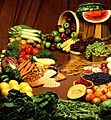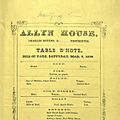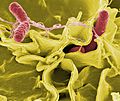Food facts for kids
Food is super important for people and animals because it gives us the energy we need to live, learn, and play! It also provides nutrition to help our bodies grow strong and stay healthy. Most of the food we eat comes from plants and animals.
When we eat, our bodies get important things like protein, fat, carbohydrates, vitamins, water, and minerals. These are like building blocks and fuel for our bodies. Liquids that give us energy and nutrition are often called "drinks." Sadly, some people don't have enough food and go hungry.
Most food for humans is grown through farming or gardening. This includes food from both plants and animals. Some people choose not to eat food from animals, like meat, eggs, or products with milk. Not eating meat is called vegetarianism. If someone doesn't eat or use any animal products (like honey or leather), it's called veganism.
| From Plants | From Animals |
| Fruit Vegetables Grains Seeds Legumes (Beans, peas, lentils, etc.) Herbs Spices |
Meat Seafood Eggs Dairy products |
After farmers grow food, it can be changed by big food companies. This is called processed food. Processed food often has many natural ingredients and food additives (like things to keep it fresh or make it taste better). For example, bread is a processed food.
We also process food at home in the kitchen when we cook. A cook might use a cookbook and tools like pressure cookers, pots, and frying pans. Food can also be prepared and served in restaurants or special dining halls, like in a school. When we eat, we use utensils like a plate, knife, fork, chopsticks, spoon, bowl, or spork.
Many people don't grow their own food. They buy it from shops or markets. Some people buy food to take home and cook, while others buy food that's already ready to eat from a street vendor or a restaurant.
Contents
Long ago, people found their food by hunting animals and gathering plants. Then, the agricultural revolution happened, and people learned to farm. Farmers started growing crops, and they even improved plants through selective breeding to make them taste better or grow more. For example, maize (corn) was greatly improved this way, which helped feed more people.
Having enough food has been a big challenge throughout history. Many people don't have enough money to buy the food they need. Sometimes, bad weather or other problems destroy crops in certain parts of the world. When people don't have enough food, they are hungry. If they don't eat enough for a long time, they can become very sick and even die from starvation. When many people in an area don't have enough food, it's called a famine.
Food and water can also make people sick if they are dirty or have harmful microorganisms, bad metals, or chemicals in them.
Staying Healthy with Food
Eating the right foods is important for staying healthy. If people don't eat enough of certain nutrients, they can get sick:
- Not enough protein can cause a disease called kwashiorkor.
- Not enough vitamin B1 can cause beriberi.
- Not enough vitamin C can cause scurvy.
- If children don't get enough vitamin D, they can get rickets.
Sometimes, people have trouble with how they eat. Some might eat too much, which can lead to being overweight or obese and cause health problems. Others might eat too little, which can cause malnutrition. Also, some people have food allergies or conditions like Coeliac disease that make them sick if they eat certain foods that are usually safe for others. It's important to eat a balanced amount and variety of foods to stay healthy.
Food and Beliefs
Many cultures and religions have special rules about food. These are called food taboos. They might say what people should not eat, or how food needs to be prepared.
- For example, in Judaism, the rules of Kashrut say that pig meat cannot be eaten.
- In Islam, the rules of Halal also say that pig meat is forbidden.
- In Hinduism, eating beef is not allowed.
- Some Christians, like those in the Seventh-day Adventist Church, choose to be vegetarian because of their religious beliefs.
Sometimes, these beliefs are part of a culture rather than a religion. For instance, some people who respect Guān Yīn (a mother goddess) will not eat beef because they believe her father had the shape of a cow.
See also
 In Spanish: Alimento para niños
In Spanish: Alimento para niños
Images for kids
-
Different plants that are eaten.
-
Different kinds of meat.
-
Various raw meats.
-
Salt mounds in Bolivia.
-
Typical Balinese cuisine in Indonesia.
-
Cooking with a wok in China.
-
A traditional asado (barbecue).
-
Café Procope in Paris was founded in 1686.
-
Global average daily calorie consumption in 1995.
-
A tractor pulling a chaser bin.
-
Packaged food aisles of supermarket in Portland, Oregon, United States of America.
-
Salmonella bacteria is a common cause of foodborne illness, particularly in undercooked chicken and chicken eggs.



























